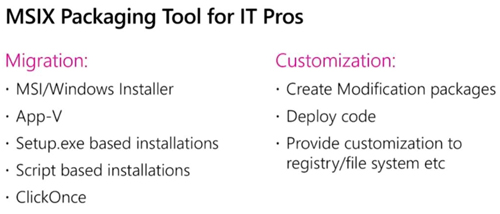News
Microsoft Replacing MSI, AppX with New Packaging Tool
Microsoft's new MSIX packaging solution, which the company eventually plans to make the centerpiece of its deployment toolset, is now available as a preview from the Microsoft Store.
MSIX is Microsoft's planned replacement for the MSI and AppX formats. The preview currently doesn't support all features, but it can be used to update "existing Win32 application packages to the MSIX format," according to the announcement. The preview will work on Windows 10 version 1803 machines using the Windows Insider Program build 17701 or later.
Once installed, the MSIX packaging tool gets automatically updated from the Microsoft Store. However, the tool can be used across any content distribution network and is not restricted to the Microsoft Store.
The Packaging Future
MSIX will be Microsoft's "deployment technology moving forward," according to John Vintzel, principal program manager lead on the apps foundation team at Microsoft, during a May Microsoft Build session, "MSIX: Inside and Out." It's aimed as a common packaging tool for both Universal Windows Platform (UWP) apps and Win32 apps. The MSIX SDK is open source on GitHub and the platform is supported on Windows, iOS, Android, macOS and Linux, Vintzel said. The SDK will enable the packaging, reading and extracting of files across any platform. Desktop Bridge apps will have 100 percent compatibility with MSIX, he added.
Vintzel had explained during the Build session that MSIX actually isn't new technology. Instead, Microsoft took the best features of Setup.exe, MSI, Windows ClickOne, App-V and script.vbs and put them into MSIX.
MSIX is conceived as simplifying enterprise deployments and breaking the chain involved with packaging apps. It will "modernize IT," Vintzel said. Currently, developers create an app that IT pros later repackage. Then the app needs to get repackaged again when there's an operating system update. It all leads to "packaging paralysis," Vintzel explained. He noted that today, packaging is typically done using either MSI or App-V, but Microsoft has not addressed its packaging since the release of App-V 3.0.
Microsoft eventually plans to start replacing App-V's AppX package format with MSIX. That will begin this fall, according to a June 29 Modern Application Deployment blog post by Microsoft Premier Field Engineers Johannes Freundorfer and Ingmar Oosterhoff.
"Starting with Windows 10 1809, MSIX will replace AppX as Package-Format completely," they wrote regarding Microsoft's as-yet-unreleased fall 2018 Windows 10 update.
However, Microsoft still plans to offer support for AppX users in Windows 10. The support is described in this bulleted list of "facts" offered by Freundorfer and Oosterhoff:
- MSIX will be available in late 2018
- App-V is a Windows 10 Inbox product in every Windows 10 Edition currently supported.
- Every Windows 10 release with an Inbox App-V Client will extend support time frames
- A MSIX converter will preserve previous investments into App-V
- All current Appx Apps will be 100% supported in MSIX
Vintzel also explained that "MSI is not going to get deprecated yet." And organizations that haven't used AppX can still use it as a foundation toward using MSIX.
Freundorfer and Oosterhoff said that "starting in fall 2018, you should start evaluating MSIX technology and its features." They added that "migration itself should be planned as soon as App-V and MSIX have feature parity."
MSIX and 'Modern IT'
With the new MSIX approach, Microsoft wants developers to package apps and have them be used as intended by them. However, it's also giving IT pros the ability to customize the apps independently without having to repackage the entire app. This capability is, in part, because MSIX uses container technology, which "separates the applications from the operating system," according to a June 18 explanation by Freundorfer and Oosterhoff. It's possible to add a modification package to the container instead of rewrapping the MSIX package. The app and the customization can be updated separately. Even multiple modification packages can be added to an app, Vintzel explained.
Microsoft also is building an MSIX Packaging Tool for IT pros, Vintzel said. It'll have an interactive installer for IT pros and developers, and will allow the packaging of first- and third-party apps. It'll have a package support framework to enable successful MSIX conversions. Microsoft plans to add a command-line interface to the tool for automation purposes, as well as templates. In addition, MSIX tooling will get built into Visual Studio at some point. Here are the capabilities that will be included in the MSIX Packaging Tool for IT pros:
 [Click on image for larger view.] Capabilities in the MSIX Packaging Tool for IT pros. (Source: May Microsoft Build session)
[Click on image for larger view.] Capabilities in the MSIX Packaging Tool for IT pros. (Source: May Microsoft Build session)
For end users, MSIX will offer the benefits of predicable deployments and clean uninstalls. There's a disk space optimization scheme with MSIX for organizations, where a single download will store all files on the disk, and subsequent requests for the apps can link to the Dynamic Link Library. There's also a network optimization capability as MSIX files can accept "differential updates at the block level" for streaming installs and app updates. These differential updates don't depend on using the Microsoft Store. The MSIX platform keeps an inventory of the apps to track any changes, and it pulls only the bits that are needed.
All of the apps are installed on a per-user basis. However, for enterprises that use shared PCs, Microsoft does have a mechanism where every user can get the update, Vintzel explained.
With MSIX, the app signature needs to be trusted on the device. It uses tamper protection built in the operating system. If the app has been changed, it gets referenced and the user will be prevented from launching the app to prevent malware from installing.
About the Author
Kurt Mackie is senior news producer for 1105 Media's Converge360 group.